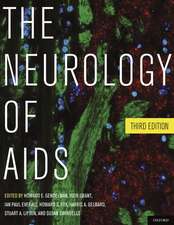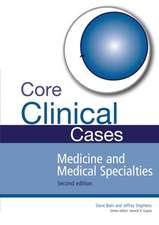A Guide to Treatments That Work
Editat de Peter E. Nathan, Jack M. Gormanen Limba Engleză Hardback – 20 aug 2015
| Toate formatele și edițiile | Preț | Express |
|---|---|---|
| Hardback (2) | 422.31 lei 39-50 zile | |
| Oxford University Press – 4 apr 2007 | 422.31 lei 39-50 zile | |
| Oxford University Press – 20 aug 2015 | 1174.90 lei 31-37 zile |
Preț: 1174.90 lei
Preț vechi: 1464.78 lei
-20% Nou
Puncte Express: 1762
Preț estimativ în valută:
224.85€ • 233.56$ • 186.77£
224.85€ • 233.56$ • 186.77£
Carte tipărită la comandă
Livrare economică 23-29 ianuarie 25
Preluare comenzi: 021 569.72.76
Specificații
ISBN-13: 9780199342211
ISBN-10: 0199342210
Pagini: 988
Dimensiuni: 191 x 254 x 56 mm
Greutate: 1.88 kg
Ediția:Revised
Editura: Oxford University Press
Colecția OUP USA
Locul publicării:New York, United States
ISBN-10: 0199342210
Pagini: 988
Dimensiuni: 191 x 254 x 56 mm
Greutate: 1.88 kg
Ediția:Revised
Editura: Oxford University Press
Colecția OUP USA
Locul publicării:New York, United States
Recenzii
It is remarkably thorough without being overwhelming. The information is readily accessible and is useful for clinicians who are referring to it briefly, or opening it to brush up on the literature in a given area. But this book's main strength is that the authors also are using an evidence-based approach to psychotherapy for many major psychiatric conditions, an area many clinicians unfortunately neglect in their treatment recommendations. This is a worthy effort and one book likely to be used over and over, not accumulating dust on a shelf.
In this book, you will find detailed research and experience-based information on pharmacological and psychological treatments, that work on a long list of disorders relating to human thought and action.
In this book, you will find detailed research and experience-based information on pharmacological and psychological treatments, that work on a long list of disorders relating to human thought and action.
Notă biografică
Peter E. Nathan, PhD, received his PhD in Clinical Psychology from Washington University in 1962. After spending two years as a research fellow, he then joined the Harvard psychiatry service at Boston City Hospital. In 1969, he became a Professor of Psychology and Director of Clinical Training at Rutgers University, later serving as Henry and Anna Starr Professor and Director of the Rutgers Center of Alcohol Studies. In 1990 he accepted the position of Provost and Distinguished Professor of Psychology at the University of Iowa and became Emeritus in 2007.Jack M. Gorman, MD, received his medical degree from the College of Physicians and Surgeons of Columbia University in 1977 and did residency and fellowship training in the Columbia University Department of Psychiatry/New York Psychiatric Insitute program. He remained on the fac ulty of Columbia University's Department of Psychiatry for the next 25 years, eventually serving as Lieber Professor of Psychiatry. He then became the Esther and Joseph Klingenstein Professor and Chair of Psychiatry and Professor of Neuroscience at the Mount Sinai School of Medicine. He is currently CEO and Chief Scientific Officer, Franklin Behavioral Health Consultants.









